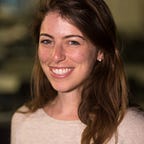We are all in the affected area
The Future is marked safe
Chartbeat CEO Tony Hail came to talk to us about metrics last week, where he strongly stated that traffic equals Facebook. It’s not news that Facebook dominates online traffic; the platform has become a moderator between news organizations and readers. During orientation week we did a scavenger hunt, where one of the tasks was to ask strangers on the street where they get their news; almost everyone I asked, mentioned Facebook is their main source; where they follow news organizations and keep up to date with the articles and videos their friends share. This is also my case, Facebook encompasses various aspects of my life: current news, entertainment, communication with friends and family, work, etc.
I was living in Paris when the November 13th terrorist attacks happened last year, a friend of mine called me on Whatsapp from Tel Aviv because she saw on Facebook what was going on; my first instinct was to also go on Facebook to see what news organizations/people were saying about the event. This corroborates with a chart that Tony showed us, demonstrating how most people read about the attacks on Facebook; in comparison, the percentage of users talking and reading about it on Twitter and Google were much lower. After the attacks happened, Facebook had the “safety check” option to let my friends in other parts of the world, know that I was safe and sound. Facebook was able to provide me with breaking news and actual facts of the event, while facilitating communication with my friends and family that weren’t able to contact me directly. These types of Facebook features create a direct and more personal relationship with users; not only was I passively reading the news but I also took an active role (as small as clicking the “safe” button) letting others know my situation.
Paris attacks were not the first time that the “safety check” feature was introduced; it had been already used during other catastrophes like tsunamis and earthquakes; Facebook realized it was a useful tool that no other platform offered. By keeping track of users’ needs and behaviors online, and through a trial and error method, Facebook aims and most of the time succeeds at filling the gaps that other social media tools haven’t been able to cover. The platform has successfully consolidated as its users’ main search engine, in great part because it’s interactive and social. This has strengthened and secured its place within the web and society. After having a love-hate relationship with Facebook for many years, I’m finally able to see its value as a platform with a great social potential. Its transformation and adaptation over the years is surprising given the amount of emerging social tools that threaten its existence. Because of it’s amazing survival and strong presence within society, Facebook shows how the future of online platforms looks like; a forum where being active is as easy as being passive.
Regarding my community, I believe that tools such as the “safety check” on Facebook can be of great use. I’m thinking of a “checking-in” option for artists painting on the streets or involved in projects, that would like to share their work with others. It would also be interesting to have a special forum where artists can see what other artists are doing at the time, if there are open studios or opportunities for non-artists of the neighborhoods to participate in the projects, or suggest a social issue to be represented in the art. However, I will be working with immigrant street artists, therefore social tools should be used carefully since the repercussions of all the “sharing” can hurt the artists. Also, due to the various controversies in East Harlem street art, we should be smart in how we advertise and spread the word. Such a platform could facilitate the communication among artists and people interested in their art, keeping everyone informed about what’s going on at the moment, giving every user a sense of belonging to the community.
